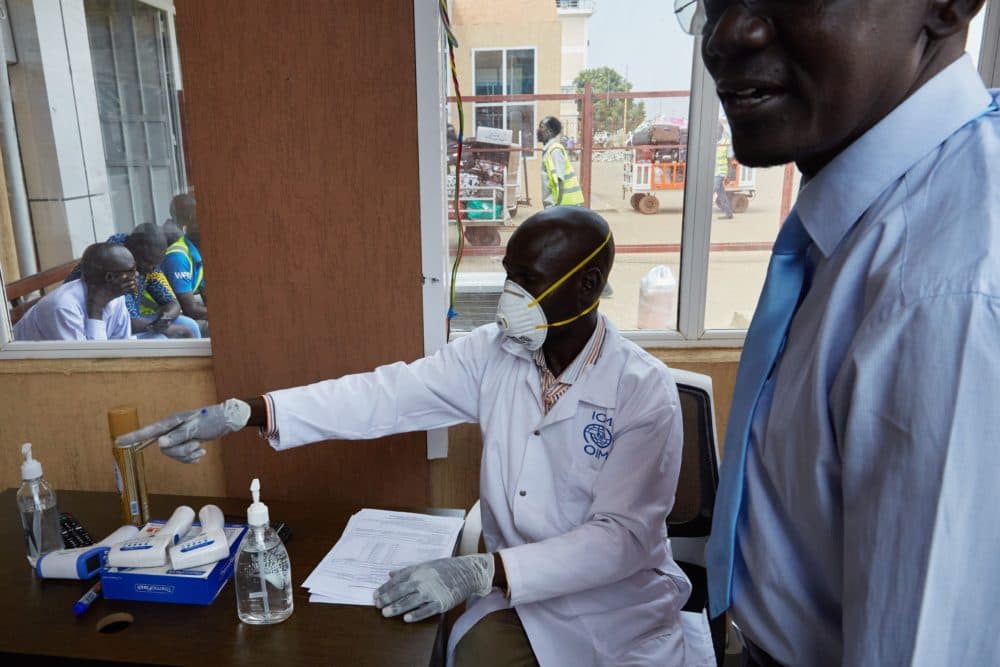Advertisement
WHO Africa Official: Continent Remains At ‘High Risk’ For Potential Coronavirus Outbreak

The coronavirus disease now has a new name: COVID-19.
In a press conference Tuesday in Geneva, the director-general of the World Health Organization announced the formal name for the disease, saying it avoids any reference “to a geographical location, an animal, an individual or group of people and which is also pronounceable and related to the disease”.
WHO is hosting a two-day meeting in Geneva with 400 scientists and officials to hasten the development of a vaccine as the disease continues to quickly spread across the globe.
So far, more than 1,000 people have died from COVID-19, mostly in China.
But on the continent of Africa, where an estimated 1 million Chinese people live, there are no confirmed cases.
Michel Yao, head of emergency response operations in Africa for WHO, says the continent remains at high risk.
“[We’ve] put them in high alert to be able to capture the cases coming from outside,” he says, “because this is likely what will be the scenario: somebody travelling from China and coming in with the disease, like what’s happened in many countries so far out of China.”
Interview Highlights
On whether there could be unreported cases in Africa
“It’s difficult to say it with 100% confidence because as we say, the scenario will be the imported cases. In total, since the alert system is in place, more than 30 people that were all tested negative, so it looks like the system at the entry point is working. The other thing is that in China, it’s a disease that is bringing many cases from contamination — so it’s a disease that is quite contagious. So if we had a cluster, based on [a] case that we miss in the entry-point, at least we will have a report of the number of people having respiratory problems [the] surveillance system can easily capture.”
On labs and testing capabilities in Africa
“At the beginning, it’s only a few laboratories that can manufacture these reagents. And of course, they have to make it available where this is manufactured and then be able to put it in the market. And WHO’s role is actually to mobilize for countries that cannot afford to produce this reagent — for them to have access to it. And the process is long. It’s required to identify the virus and then produce it. And thanks to some of the countries that are bilaterally receiving it for their partners, including [Centers for Disease Control and Prevention] Atlanta in U.S., even CDC China, that try to support some of the countries. And WHO is trying to purchase some. But the demand is huge. But we are lucky that we are at least moving because last week, we had two labs. Now, we have 15. Toward the end of the week, we may have more than twenty countries out of the 47 that we are covering in our region.”
On what would be a greater challenge — a coronavirus outbreak or Ebola outbreak
“The Ebola outbreak [was difficult] because of the involvement, mainly insecurity. You recall that we even lost many health workers. But [with] Ebola, we have an effective vaccine. We have also some promising therapeutics. So at least we have the means to control, if we have access. But in novel coronavirus, we don’t have a treatment yet, we don’t have a vaccine yet, and it’s highly contagious. Just someone sneezing or coughing, you can easily contract. [With] Ebola, you have to touch what is contaminated or anybody’s fluids that is contaminated. This one can be even somebody close to you being contaminated. And the fear, the concern, is also the number of people that could be contaminated. We have more than 40,000 in China. So imagine the same scenario occurring in Africa and with about 10%, 15% having a severe form of the disease. It could be difficult to manage with the level of healthcare in Africa.”
On the ongoing flights between China and Africa
“It was made clear by a worldwide well-recognized expert, that from their assessment, they say there is no need yet to restrict travel because China has already put into place a kind of containment measure. The advice, also, was to have a strong screening process at the exit point and, at the same time, at the entry-point put a stronger system. And the airlines should also train their crew to be able to manage any people that could become symptomatic within the flight.”
Ciku Theuri produced and edited this interview for broadcast with Tinku Ray. Theuri also adapted it for the web.
This segment aired on February 11, 2020.
